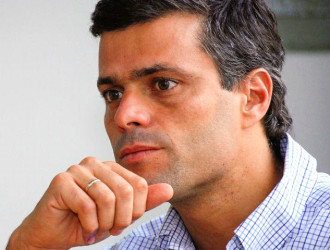CARACAS, (Reuters) – Venezuela accused the United States yesterday of jeopardizing a nascent rapprochement between the two ideological foes with “insolent” criticism of a 14-year jail sentence handed to opposition leader Leopoldo Lopez.

Coming on top of the outrage of Lopez’s family and supporters following his conviction late on Thursday, U.S. Secretary of State John Kerry said Washington was “deeply troubled” as he called the charges “illegitimate” and urged the release of all jailed government opponents. “With its insolent meddling, the United States has kicked the timid steps achieved towards regularizing bilateral relations,” Venezuela’s foreign minister, Delcy Rodriguez, said via Twitter, accusing Kerry of “aggressions” and “offenses.”
After more than a decade of acrimonious ties and without respective ambassadors, Washington and Caracas this year began a cautious rapprochement by trying to cooperate on issues from Colombian peace talks to Haitian democracy.
But U.S. officials have repeatedly raised the case of Lopez and a handful of other jailed activists who oppose President Nicolas Maduro’s socialist government. “The United States persists in destabilizing legitimate and constitutional governments, using agents and terrorist violence,” Rodriguez added, saying she had communicated those views to Kerry in a telephone conversation.
Hardline opposition leader Lopez was convicted of inciting 2014 anti-government protests that led to violence killing 43 people. He was found guilty of provoking arson, violence and damage to public property and condemned to 13 years and nine months in prison.
“We live under a repressive, anti-democratic regime,” said Lilian Tintori, a former champion kite-surfer who has two children with Lopez and has led a well-oiled international campaign to lobby for his release.
She called for a protest march on Sept. 19 and read a hand-written letter from her husband defying the Maduro government.
“This sentence is not only against me but rather it seeks to destroy the morale of all those of us seeking a better country,” it said.
A U.N. human rights spokesman criticized the “harsh sentence” and reported trial “irregularities,” while U.N. Secretary-General Ban Ki-moon raised the issue at a meeting with Rodriguez in New York.
During the mainly closed-door trial, Judge Susana Barreiros rejected 58 of the 60 defense witnesses, though she allowed the prosecution 108 witnesses, according to Lopez’s lawyers, who are appealing.
“This trial was not objective,” said Diana Quintero, 50, a publicist, weeping in the wealthy Caracas district where Lopez was once mayor. “Maduro sees Lopez as his strongest rival.”
Maduro says Lopez is a dangerous criminal and pawn of the elite, intent on subverting the government under the guise of peaceful protests. He points to Lopez’s attempts to unseat the late Hugo Chavez during a failed coup in 2002.
“There’s no way Leopoldo Lopez can participate in killing and be freed,” said Carmen Quintero, dressed in a red Socialist party T-shirt with a group of relatives of government supporters killed in 2014.
Despite opposition fury, streets were calm yesterday. With inflation raging, shortages from cancer medicines to spare parts, and a biting recession, many Venezuelans were simply consumed with day-to-day survival.
“I didn’t follow any of the trial,” said beautician apprentice Emily, 19, in a queue outside a supermarket. “I only have one roll of toilet paper at home. I arrived here at 3 a.m. This country is a complete disaster.” Opposition politicians are seeking to channel such anger into votes in the Dec. 6 election, which polls forecast they stand a strong chance of winning.
Some opposition moderates see Lopez as a hot-headed egotist who miscalculated when he called for the demonstrations, which led to several politicians’ arrests and failed to gain much traction beyond affluent areas.
Still, some in the opposition are pessimistic about their odds of victory in the face of a powerful state propaganda apparatus, institutions filled with “Chavistas” and an electoral playing field seen benefiting the government.
“We’re completely kidnapped on a judicial, political, social and economic front,” said human resources manager Angel Rojas. “Thirteen years, 9 months, 7 days, and 12 hours? It’s a complete disgrace.”





